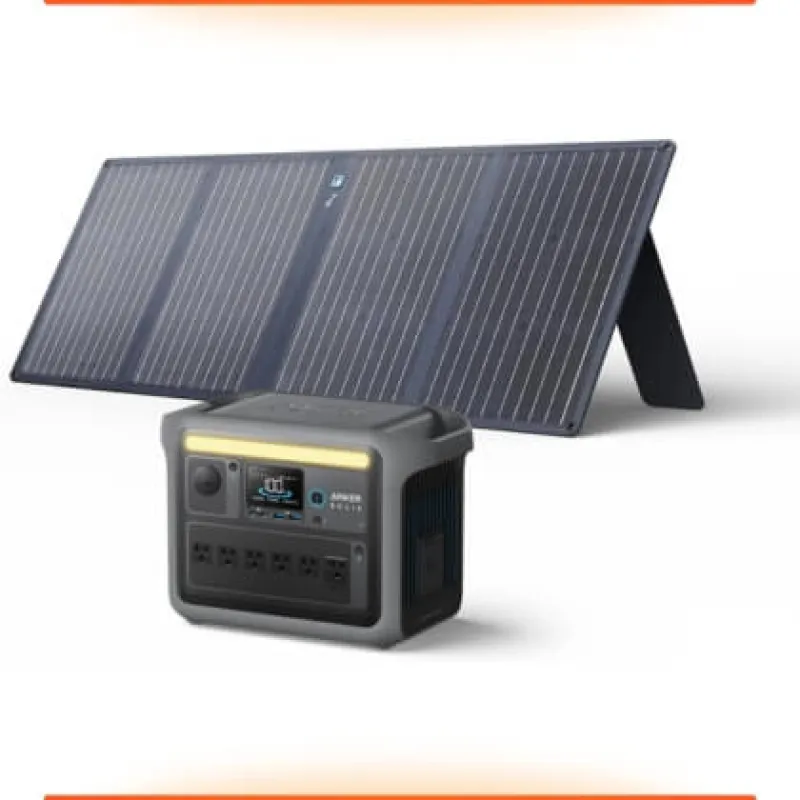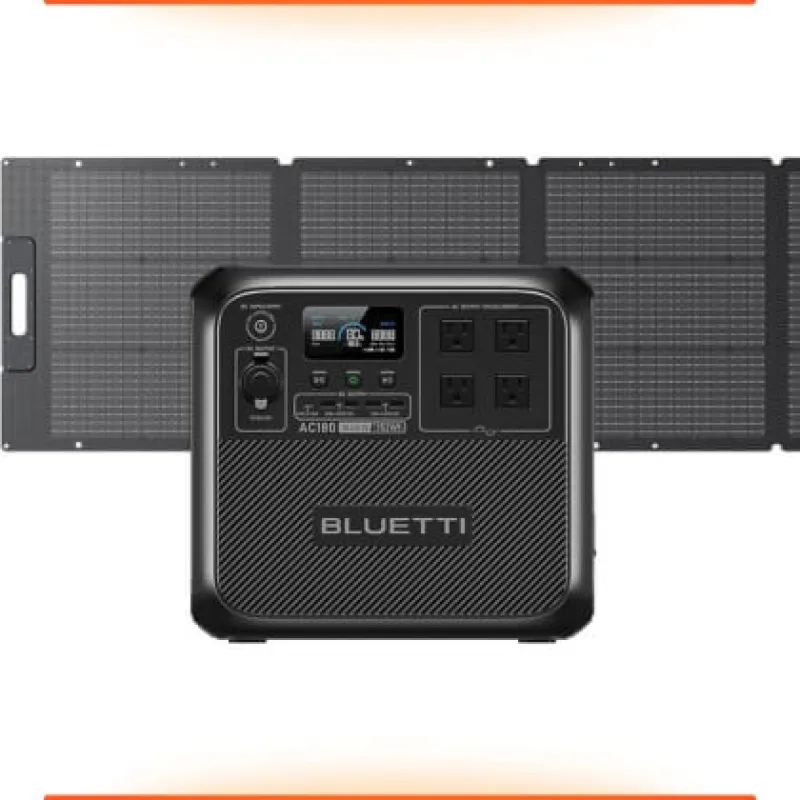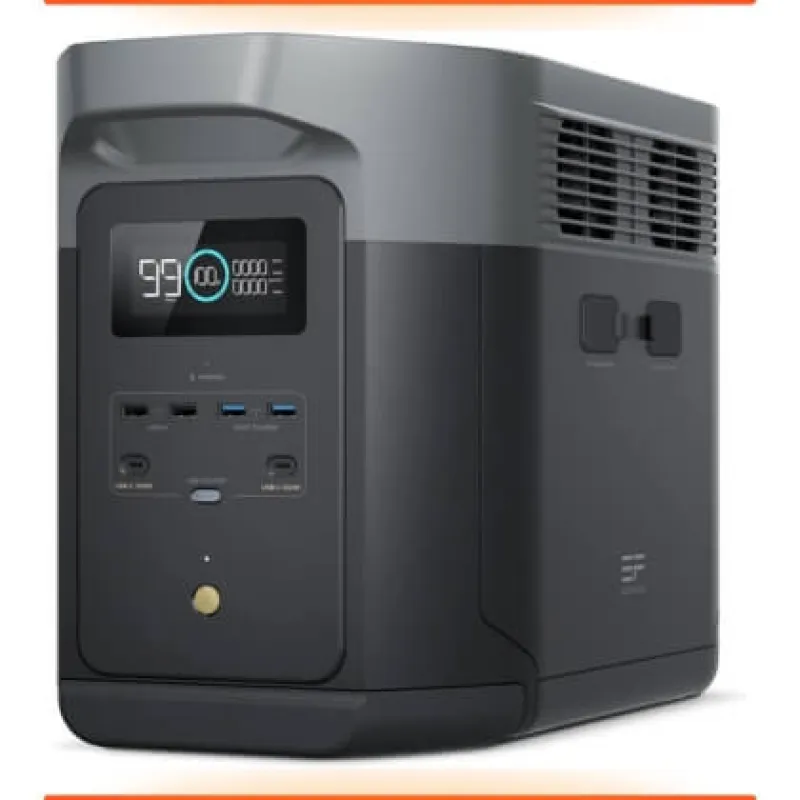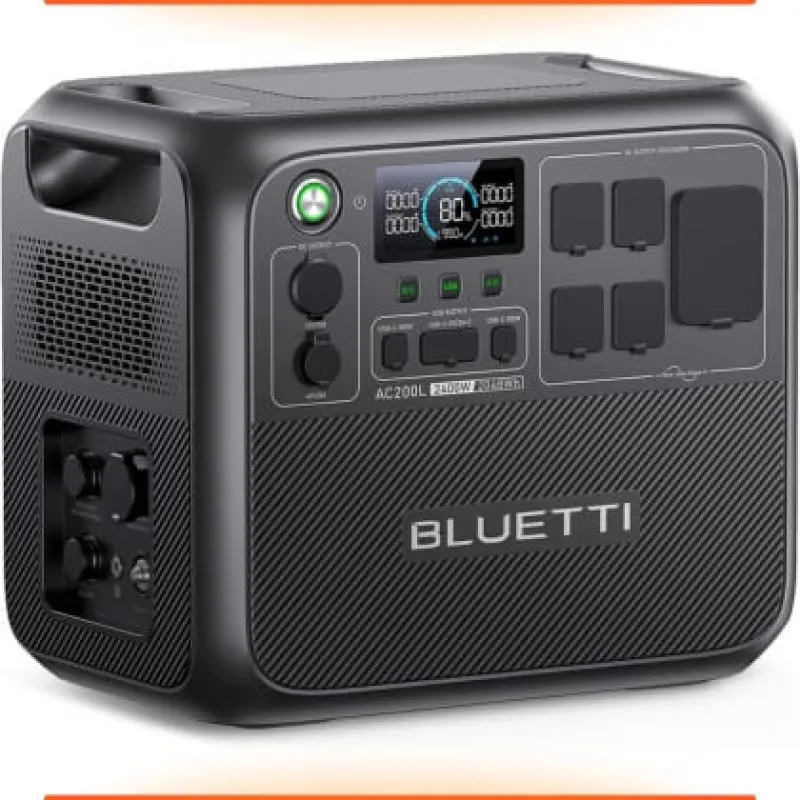
Please note that this post contains affiliate links, which means authors may earn from qualifying purchases at no extra cost to you if you purchase through a link.
- Essential Gear and Power Needs: A successful camping trip requires a portable power station to charge essential devices. Estimate your power needs (600 Wh for each weekend day) and choose a station with 800-1000 Wh capacity, multiple ports, solar recharging, and durability.
- Advantages Over Gas Generators: Portable power stations are favored for camping over gas generators because they are lightweight, quiet, eco-friendly, versatile, safe for indoor use, and require low maintenance.
- User-Friendly Features: Portable power stations feature user-friendly interfaces, displays, and mobile apps for easy monitoring and management. Advanced models offer real-time tracking and control of multiple devices, ensuring a hassle-free camping experience.
When prepping for your next forest trip with tents, having the right gear can turn a good time into a great adventure. If you love outdoor camping, you get how crucial a good portable power station is to keep your devices juiced up. Let's check out some top picks for camping gear and more.
Essential Camping Power: How To Pick The Perfect Portable Stations For A Weekend Escape
To put together our list of top portable power stations, we looked closely at the power needs of various key gadgets. We focused on essentials for our trip like keeping the phone charged and running a small headlamp. For a bit more comfort, we planned for a minimal setup that includes a mini fan, a portable Bluetooth speaker, an action camera, two smartphones, one tablet, and of course, a laptop for movie nights in the tent. We also added a mini fridge and a rechargeable flashlight for camping. Since we’re going on this tent adventure as a couple, we doubled smartphone consumption to ensure we both stay comfy and connected.
Here is a list of essential electric devices needed for a weekend of camping, along with calculations of average daily electricity consumption to meet your needs:
- Mini Fan: 20 Wh
- Portable Bluetooth Speaker: 20 Wh
- Action Camera: 16 Wh
- Smartphones (2): 20 Wh each
- Tablet: 30 Wh
- Laptop: 60 Wh
- Mini Fridge: 400 Wh
- Rechargeable Flashlight: 5 Wh
For every weekend day, you're looking at about 600 Wh of power consumption. To cover any inefficiencies and have a buffer, aim for a portable power station with a capacity of around 800-1000 Wh. It's good to have multiple output connectors to juice up different devices together and the option to recharge via solar panels, especially if you're camping without a car or power grid.
Finally - the ideal camping portable power station should have the next specs:
- Capacity of at least 600 Wh
- Support for multiple charging ports (USB-A, USB-C, and potentially AC outlets)
- Ability to be recharged without the car or power grid, such as through solar panels
- Compact and lightweight design for easy portability
- Durable construction to withstand outdoor conditions
- Safety features like overcurrent and overcharge protection
- A great plus is additional built-in flashlights

Why We Not Considered Gas Generators for Camping?
To begin with, how are power stations different from generators? It's simple: the generator generates electricity, and the charging stations store it in themselves, charging from ordinary sockets, and then distribute it.
Basically, a gas generator could cover all camp consumption needs. But when we started writing this post about the best power stations for camping, portability and the ability to charge with solar panels were the key factors when choosing. But let's take a closer look at why gas generators were not considered for this type of adventure. A portable power station is more convenient for weekend camping than a gas generator for several reasons.
- Portability: Portable power stations are designed to be lightweight and compact, making them easy to transport and store. They are about the size of a small cooler and can weigh as little as 20 lbs, allowing you to easily carry them in a backpack or store them in your vehicle. In contrast, gas generators are at least three times bigger and substantially heavier, weighing 100 lbs or more.
- Quiet operation: Portable power stations operate silently, which means you can use them in quiet camping areas without disturbing the peace and tranquility of nature. Gas-powered generators can be noisy and disruptive to the camping experience.
- Eco-friendly: Portable power stations are powered by rechargeable batteries and do not emit harmful pollutants or greenhouse gases like traditional gas-powered generators. This makes them a more environmentally friendly option for camping.
- Versatility: Portable power stations come with a variety of built-in outlets and charging ports, allowing you to power a wide range of electronic devices, from smartphones to laptops and even portable refrigerators. They can be recharged using solar panels, wall outlets, or car chargers, providing flexibility to suit different camping scenarios.
- Safety: Battery-powered portable power stations do not produce carbon monoxide gas, which can be dangerous when using gas-powered generators indoors or in enclosed spaces. They are safe to use inside tents or RVs.
- Low maintenance: Portable power stations require little to no maintenance, unlike gas generators that need regular filter and spark plug changes.
In summary, the compact size, quiet operation, eco-friendliness, versatility, safety, and low maintenance of portable power stations make them a more convenient and practical choice for weekend camping compared to traditional gas generators.
Top 5 Portable Power Stations
Anker SOLIX C1000 with Solar Panel
- 1056 Wh capacity, 1800W output
- Compact and lightweight at 27.59 lbs
- Includes Anker SOLIX 100W solar panel
- 11 ports (6 AC outlets), simultaneous powering
- Built-in LED flashlight
- Pros: Fast recharging time (58 min)
- Cons: Smaller solar panels are less powerful than others

Anker SOLIX C1000
Anker SOLIX C1000 Portable Power Station with 100W Solar Panel, 1800W Solar Generator, 1056wh LFP (LiFePO4) Battery, 6 AC Outlets, Up to 2400W for Home, Power Outages, and Outdoor Camping
User Guide: PDF
Price
BLUETTI AC180 with Solar Panel
- 1152 Wh capacity, 1800W output
- Weight: 35.3 lbs
- Includes BLUETTI PV200S 200W solar panel
- 11 outlets (4 AC outlets) to handle almost anything you plug in
- Can function as a UPS at home.
- Pros: Great surge with 1800W.
- Cons: A bit noisy

BLUETTI AC180
BLUETTI Solar Generator AC180 with PV200S Solar Panel Included, 1152Wh Portable Power Station w/ 4 1800W (2700W Surge) AC Outlets, LiFePO4 Emergency Power for Camping, Off-grid, Power Outage (AC180+PV200S)
User Manual: PDF
Price
Usual price - $1598.00
Jackery Explorer 1000 with 2 Solar Panels
- 1002 Wh capacity, 1000W (2000W surge) output
- Compact and portable design with a 34 lbs weight
- 2x100W Solar Panels included
- 3 AC outlets, 2 USB-C, 2 USB-A, car port
- Pros: Compact and portable design, solar charging
- Cons: Long charging when compared to the same capacity power stations.

Jackery Explorer 1000
Jackery Solar Generator Explorer 1000, 1002Wh Capacity with 2xSolarSaga 100W Solar Panels, 3x1000W AC Outlets, Portable Power Station Ideal for Home Backup, Emergency, RV Outdoor Camping
User Manual: PDF
Price
EcoFlow DELTA 2 Max Power Station
- 2 kWh capacity, 2400W (4800W surge) output
- Weight: 50 lbs
- Features: 6 AC outlets, 2 USB-C, 2 USB-A, car port
- Pros: Expand capacity from 2kWh to 6kWh by adding up to 2 solar-powered batteries
- Cons: Comparing power stations with solar panels - heavier and more expensive

EcoFlow DELTA 2 Max
EF ECOFLOW Portable Power Station DELTA 2 Max, 2400W LFP Solar Generator, Full Charge in 1 Hr, 2048Wh Solar Powered Generator for Home Backup (Solar Panel Optional), model - EFD350-EB
User Manual: PDF
Price
Bluetti AC200L Portable Power Station
- Capacity 2048 Wh, output 2200W (4800W surge)
- Weight: 61.41 lbs
- 11 ports: 4 AC outlets, 1 30A AC outlet, 1 48W DC, 2 USB-C ports, 2 15W USB-A, 1 car port.
- Can function as a UPS (15ms)
- Pros: Massive capacity (expandable to 8192Wh), multiple charging options, 45 min. fast recharge
- Cons: Very heavy at 60 lbs

Bluetti AC200L
Portable Power Station AC200L, 2400W LiFePO4 Battery Backup, 2048Wh Expandable to 8192Wh, Solar Generator for Home Backup, RV Trailer, Power Outage (Max 1200W Solar Input)
User Manual: PDF
Price
Usual price - $1999.00
Final Thoughts
Each power station on this list has its own cool features and abilities for handling power needs while camping or in emergencies. The portable power stations listed here offer different options for managing and controlling how they work. Most of them have easy-to-use interfaces, with built-in displays or companion mobile apps. You can keep an eye on battery levels, adjust output settings, and manage charging preferences easily. For example, the Anker SOLIX C1000 has a compact and simple interface (you can customize charging speeds and track power statistics in real-time with the Anker app too), while the EcoFlow DELTA 2 Max and Bluetti AC200L give you more advanced options like controlling multiple devices at once and customizing power settings through the app. These power stations also come with detailed manuals to help you set up, use, and maintain them for the best performance and safety.
So we won't be the first to say that a portable power station will be a game changer for your next forest (or lake) adventure. With it, you get guarantees that your devices remain alive and ready, and rest does not cause a lot of trouble and noise.
You Also May Interested
Best Selfie Tripod for 2024: Which One Should You Take On Vacation?
Discover the best tripod for 2024 to capture stunning photos and videos during your vacation. Pack smart and make lasting memories with the perfect selfie stick!
Detail-oriented editor aiming for excellence. I keep up with web dev, gaming, and tech trends in my free time and write about



